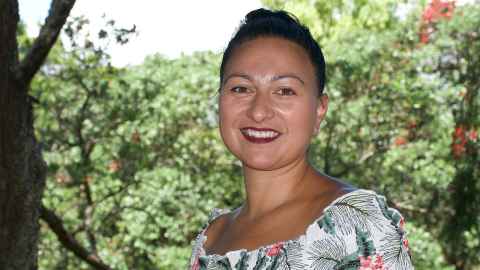The key to understanding Pasifika education
26 February 2019
Opinion: Associate Dean Pasifika, Jacoba Matapo, explains why understanding the spirit of the collective is vital for Pasifika engagement in tertiary education.

The motivation for Pasifika success in education for at least 17 years has been tied to education outcomes, specifically academic measures, and participation and retention rates. Yet research in Pasifika education continues to tell us that such measures for success must be contested to provoke change in education that is responsive to Pasifika ways of being and knowing.
A 2018 study of Pasifika success at the University of Auckland’s Faculty of Education and Social Work revealed Pasifika success, for both Pasifika staff and students, is centred upon the spirit of the collective; having collective purpose as well as academic resilience. So why is understanding the spirit of the collective vital for Pasifika engagement in tertiary education?
The fact is, education philosophy and policy within Aotearoa is fundamentally based upon the Western canon, where liberal and progressive ideals infuse particular identities of learners, and that is mainly the learner as an individual, autonomous and self-directing. For Pasifika, the notion of individual as such is not so clear cut. The complexity lies in understanding how the individual Pasifika learner is situated in time and space (vā), connected to past, present and future – the relationship extends beyond people and the here and now; it is open to ancestors, lands, ocean, cosmos. How can education create spaces to reconceptualise Pasifika success that is conducive to the histories, futures, life and spirit of the Pasifika collective?
If we look at the history of Pasifika education in Aotearoa, we see that the first Pasifika education initiatives were in early childhood education in the 1970s, known as Anau Ako Pasifika, and were introduced by Pasifika community members for young Pasifika children. The intent, to sustain Pacific languages, culture and knowledge. Pasifika leaders knew the value of education in sustaining specific cultural practices, identity, language, values and beliefs.
It is the local Pacific knowledges for Pasifika peoples that ties the collective to place, ancestors and people.
But the following 20 years brought about shifts in the discourse around Pasifika education. A dominant focus for success in Pasifika education became centred upon the direct productivity of ‘qualifications’ to the nation’s economic capital which gave rise to particular targets in education policy and strategies. Pasifika education, which was established to revitalise and further Pasifika culture, shifted to being presented in education research as the underachievement of Pacific peoples in education - essentially perceived as the ‘problem’ tail end of education success in Aotearoa.
The deficit representation of Pasifika engagement in education led to the ongoing focus of Pasifika education success through the Pasifika Education Plan (PEP), with four revised versions spanning 17 years. The 2018 launch of Tapasā (Cultural Competency Framework for Teachers of Pacific Learners) has attempted to capture the essence of the PEP. Though each version of the PEP characterises Pasifika success as holistic, including language, culture and identity, these aspirations for Pasifika success become marginalised when narrow and often standardised education assessment measures take precedence for measures of ‘success’.
As education strategic and policy reviews in New Zealand draw public attention to global education and economic trends including future-focused innovations, we run the risk of privileging global knowledge versus local knowledges. It is the local Pacific knowledges for Pasifika peoples that ties the collective to place, ancestors and people.
The Ministry of Education states that successful Pasifika learners may be ‘…secure and confident in their identities, languages and culture’ however, the fact remains that if we are to see espoused Pasifika characteristics as the impetus for Pasifika education success, then existing Pasifika education policies and strategies must be called into question and reconceptualised.
Jacoba Matapo is Associate Dean Pasifika at the Faculty of Education and Social Work. This article reflects the opinion of the author and not the views of the University of Auckland.
Used with permission from Newsroom The key to understanding Pasifika education published on 26 February 2019.